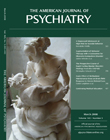Medication Effects in Neuroimaging Studies of Bipolar Disorder
Abstract
Objective: Neuroimaging studies are promising components for a new diagnostic framework for bipolar disorder, but a major issue is the potential confound of psychotropic medication upon experimental measures. Withdrawing all individuals from medication and examining only unmedicated individuals may be clinically unfeasible, and examining only unmedicated individuals may render findings less generalizable. Method: The authors review structural and functional neuroimaging studies of medicated and unmedicated patients with bipolar disorder to discern the possible confounding effect of medication. Results: Findings from studies identified on MEDLINE that included medicated individuals with bipolar disorder indicated either no significant effect or ameliorative effects of psychotropic medications on abnormal structural and functional neuroimaging measures relevant to pathophysiologic mechanisms of the disorder. Different strategies for assessing medication effects are compared. Conclusions: Neuroimaging studies of bipolar disorder ideally should recruit both unmedicated and medicated individuals. Individuals who are unable to tolerate medication withdrawal likely have more severe illness and are especially informative for research examining biomarkers of illness and treatment response.



